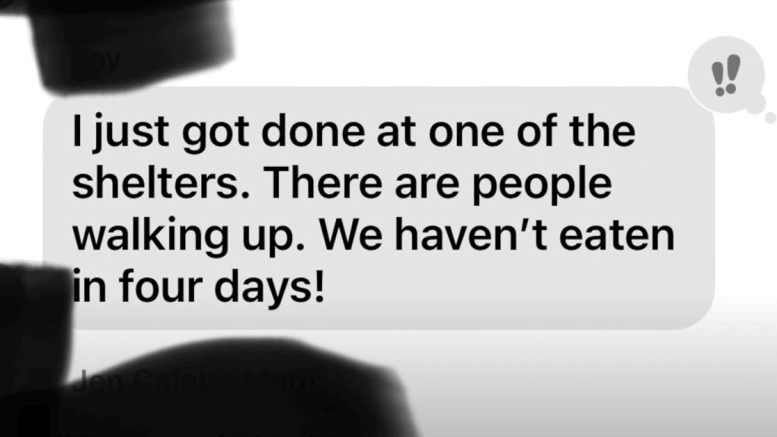CHECK BACK DAILY FOR VIDEO “ONSITE” UPDATES AND EYE-WITNESS REPORTS ADDED TO THE BOTTOM OF THIS
In the wake of Hurricane Helene, the affected communities in Western North Carolina experienced unprecedented devastation. This blog post highlights the resilience of the people caught in the storm’s path through their stories, reflecting a poignant narrative of survival, community strength, and the pressing need for improved disaster response strategies.
The Immediate Aftermath: A Local’s Perspective
Christy Thrift, a resident and guide from NC Outdoor Adventures, recounts the terrifying experience during and after Hurricane Helene swept through her community. As the river near her home swelled to catastrophic levels, the lack of early and effective response from emergency services left the locals to fend for themselves.
“We were down here for about three days with no outside help,” Christy explains, standing near the remnants of what used to be a neighborhood. “It was all neighborhood folks and neighbors that got us out. We dug out the road ourselves, got insulin to those who needed it, and tried to evacuate as many as we could.”
The community’s self-reliance during those critical first days was a testament to their resilience. Using shovels and sheer will, they managed to clear pathways, share scarce resources, and provide makeshift rafts for evacuation. But the emotional toll was heavy, especially as they discovered that not everyone could be saved. “Lenny’s house, it was just gone,” Christy recalls, her voice breaking. “We watched his house float away.”
The Power of Community in Crisis
Another resident, who runs the Aeroponic Tower Channel on YouTube, shared her experience on the ninth day post-Hurricane Helene. Despite personal losses, she focused on aiding her community by distributing food and supplies and sharing updates through her channel. She highlighted how local efforts filled the gaps left by overwhelmed official responses.
“We’ve become resource-heavy since day seven, with resources rolling in, but not everyone can get to them,” she explains. The logistical nightmare of destroyed roads and bridges meant that some residents were cut off from essential supplies. In response, locals with ATVs and knowledge of the terrain became lifelines, delivering food, water, and medical supplies to those trapped in remote areas.
Her story underlines a critical lesson: in the absence of immediate external help, the infrastructure of community and neighborly support is indispensable. “It’s truly unbelievable,” she says, describing how crop planes began to fly over, dropping supplies into hard-to-reach areas—a makeshift but vital solution until more structured help could arrive.
Lessons Learned and a Call for Better Preparedness
The experiences shared by these residents not only underscore the immediate human impacts of such disasters but also highlight significant deficiencies in disaster preparedness and response. Both stories reflect a larger narrative of communities repeatedly left to manage independently due to slow or inadequate governmental response.
From these harrowing experiences, a common theme emerges: the imperative for communities to establish local disaster preparedness plans that include training, resource allocation, and robust communication strategies that do not rely solely on traditional systems, which can fail during severe disasters.
A Strong Message: Self-Reliance Over Dependence
As we recount the resilience shown by these communities, it becomes evident that waiting for government aid like FEMA in the immediate aftermath of a disaster may not always be feasible. These stories serve as a stark reminder that self-reliance and community-driven initiatives often provide the first line of support when disasters strike. This reality should not diminish the role of national support systems, but rather underscore the vital importance of local preparedness and immediate action.
Conclusion: Moving Forward with Resilience
Hurricane Helene brought devastation, but from its wake rose stories of incredible community strength and resilience. These narratives should serve as both a reminder of the vulnerabilities that exist and a call to action for all stakeholders—local governments, organizations, and individuals—to invest in comprehensive disaster preparedness and community resilience programs. Only through proactive planning and strengthening local capacities can communities hope to mitigate the impacts of future disasters and protect the most vulnerable among us.
As we reflect on the stories from Hurricane Helene, let us commit to not only remembering the names and faces of those who stood strong amid the chaos but also to ensuring that their experiences lead to actionable change in disaster readiness and response strategies. Let the lessons of Helene inspire us to cultivate a culture of self-sufficiency and community collaboration, where the wait for external help becomes an exception, not the rule.
DAILY UPDATED BELOW
10/6
17:16 ET
Bikes and Beards, the channel of SRK Cycles. It’s about a group of Christian guys who ditched their dreaded 9-to-5 jobs to pursue a life they genuinely love, combining their passion for motorcycles with a dedication to work-life balance. They’re on a mission to shake up the motorcycle industry, proving that it’s possible to follow your dreams while juggling the demands of work and family.
We Went to Asheville, NC to Help, and It’s Worse – Much Worse
In this episode, we travel to Asheville, NC to provide aid to communities devastated by Hurricane Helene. The situation is dire—isolated towns with no power or communication, people without basic necessities, and a daunting network of damaged roads making rescue efforts nearly impossible. We share our experiences working alongside volunteers like Jimmy from Jimmy’s World and Seth from Burn Peak, attempting to reach those in need, and the obstacles we faced in delivering supplies. From hijacked trucks to unexpected roadblocks, it’s a story of resilience, teamwork, and faith in the midst of a crisis.

